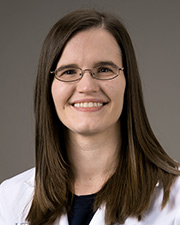Epilepsy Fellowship Program
Overview
The Texas Comprehensive Epilepsy Program (TCEP) at McGovern Medical School – UTHealth Houston has a legacy of excellence in the treatment of epilepsy and in the training of epileptologists and neurophysiologists. Our ACGME-accredited epilepsy fellowship program was established in 2018, and our faculty have educated fellows for several decades prior to that as part of our ACGME-accredited neurophysiology fellowship program.
The ACGME-accredited epilepsy fellowship is a one-year program with the option to pursue a second year of fellowship in the ACGME NST Intracranial EEG or Magnetoencephalography (MEG) fellowship programs. Fellowship applicants for the ACGME-accredited epilepsy fellowship must be on track to complete or have already completed an ACGME-accredited residency program in neurology, or child neurology.
Additionally, we have an ACGME NST Intracranial EEG fellowship program (J-1 visas supported). This is a one-year fellowship focused on intractable epilepsy management, intracranial EEG, and advanced imaging modalities. There is an opportunity to obtain additional training in epilepsy neuromodulation, autoimmune epilepsy, MEG, and genetics/precision epilepsy. Applicants must be either U.S. trained neurologists or internationally trained neurologists with ECFMG certification.
The Epilepsy Fellowships at UTHealth TCEP are premier learner-centric programs that provide advanced training in all aspects of epilepsy patient care. UTHealth TCEP is a Level 4 epilepsy center with a high volume of epilepsy surgeries and extensive experience treating the most complex cases. More than 100 epilepsy surgeries are performed annually in both adult and pediatric patients.
Fellows benefit from robust programs in:
- Epilepsy surgery – resections, laser ablations, functional hemispherectomy, corpus callosotomy, Phase II evaluations with stereotactic EEG or subdural electrodes, neuromodulatory devices
- Neuromodulation – RNS, DBS, and VNS
- ICU EEG
- Outpatient epilepsy – epilepsy clinics including specialty clinics for Spanish-speaking patients, neuromodulation, autoimmune epilepsy, epilepsy genetics
- Clinical trials – medications, devices, and diagnostic procedures
- Epilepsy Research – Texas Institute for Restorative Neurotechnologies (TIRN)
- Educator Development – longitudinal programs, workshops, and other resources available through the Office of Educational Programs to develop teaching skills and develop an Educator Portfolio
Our Team
Our program has a strong, multidisciplinary team dedicated to epilepsy care, which currently includes adult epileptologists, pediatric epileptologists, adult and pediatric functional neurosurgeons, neuroradiologists, neuropathologists, neuropsychologists, physician assistant and nurse practitioners, nurses, EEG technologists, medical assistants, research scientists, statisticians, and engineers. Our team includes faculty who are international opinion leaders and teachers, experts in SEEG and invasive studies of the human brain. Some of the faculty are active, federally (NIH) funded researchers, and there are many opportunities for mentorship and publications in clinical and translational research. Our team members have a strong presence at the national and international levels with organizations such as the American Epilepsy Society, the American Academy of Neurology, the International League Against Epilepsy, the Child Neurology Society, the American Clinical Neurophysiology Society, the American Association of Neurological Surgeons, and the Congress of Neurological Surgeons. Our faculty frequently contribute to peer-reviewed journals, discipline guidelines, and present at national and international meetings.
Training Experience
Training is primarily based at our state-of-the-art facilities at Memorial Hermann Hospital in the Texas Medical Center in Houston, Texas, which houses our Epilepsy Monitoring Unit. We help care for patients with seizure concerns in the dedicated neurocritical care units, medical intensive care units, and neonatal intensive care units, providing other services as needed for inpatient consultations. Our training program offers experience with the latest technologies, including:
- High-resolution MRI
- Magnetoencephalography (MEG)
- Ictal single-photon-emission computed tomography (SPECT)
- Positron emission tomography (PET)
- Functional and anatomic magnetic resonance imaging (fMRI)
- Wada testing
- Transcranial magnetic stimulation (TMS)
- Computational reconstruction programs: 3D Slicer, Curry, Brainstorm
- AI/Quantitative EEG software: Persyst
The fellowship program is designed to maximize learning and clinical experience and is intended for those planning careers in academic medicine as well as those headed for private practice. Training begins with an 8-week epilepsy neurophysiology course that provides a highly effective introduction to clinical EEG, followed by weekly didactics. There are weekly patient management conferences, monthly epilepsy surgery case review conferences, monthly epilepsy grand rounds with invited speakers, weekly neurology grand rounds, bimonthly epilepsy journal clubs, and bimonthly networking events and lectures from epilepsy experts within the Texas Medical Center (EpiEx). Participation in national and international epilepsy meetings is encouraged, and fellows can be sponsored to attend one or more meetings. Clinical rotations include the Epilepsy Monitoring Unit, continuous ICU-EEG, routine EEGs, ambulatory EEGs, Ceribell EEG, outpatient epilepsy clinics, and elective opportunities in areas such as intra-operative monitoring (NIOM), MEG, sleep, neuropsychology, neuroradiology, and research.
Application Information
The Texas Comprehensive Epilepsy Center (TCEP) at McGovern Medical School – UTHealth Houston is recruiting fellows for the ACGME-accredited epilepsy fellowship program to start training July 1, 2027. We will be participating in the Epilepsy Match with applications accepted through ERAS. You will find a summary of our fellowship track options available through the Match here.
Anticipated timeline for Epilepsy Match season:
| November 12, 2025 | Applicants may begin submitting applications through ERAS |
| December 3, 2025 | Programs may begin reviewing applications submitted through ERAS |
| December 2025 to January 2026 | McGovern Medical School at UTHealth Houston Epilepsy Fellowship interviews |
| April 29, 2026 | Rank list deadline |
| May 13, 2026 | Match Day! |
| July 1, 2027 | 1st day of fellowship |
Required application materials:
- CV
- Personal statement describing your interest in epilepsy and career goals
- Letters of recommendation (3)
- USMLE transcript
- Professional photo
If you would like to apply only to the ACGME NST Intracranial EEG fellowship program (J-1 visas supported), please send your CV, personal statement, USMLE transcript, and three letters of recommendation to the epilepsy fellowship program manager, Andrew Coulter at [email protected]. Internationally trained neurologists should also send ECFMG certification with their application materials.




